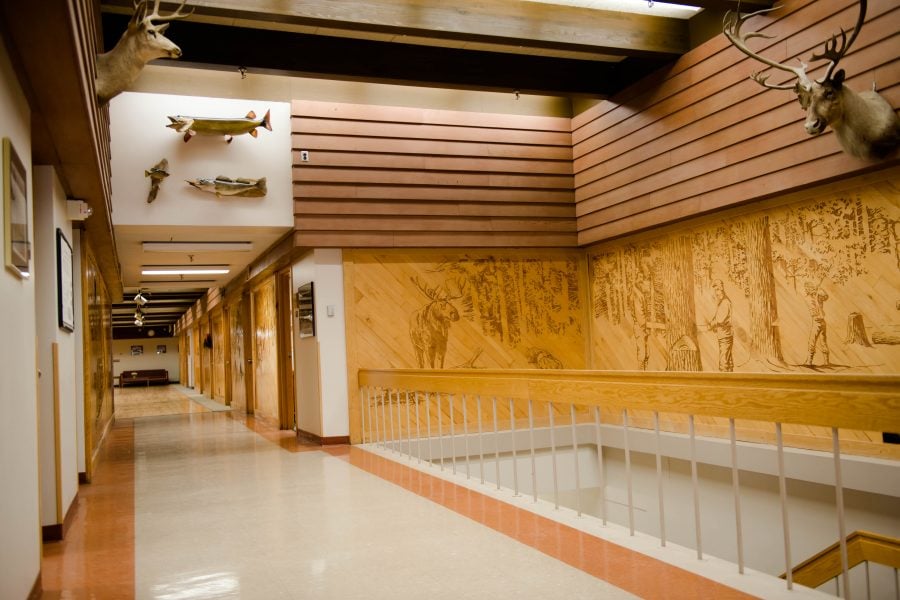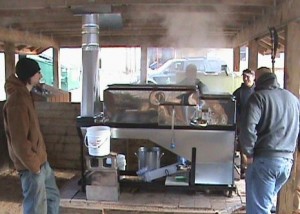
The College of Forest Resources and Environmental Science welcomed two new faculty members and celebrated our faculty moving into new positions in the college this year.

The College of Forest Resources and Environmental Science welcomed two new faculty members and celebrated our faculty moving into new positions in the college this year.

Assistant Professor Evan Kane (SFRES/ESC) has received $123,698 from the US Forest Service for, “Response of Forest and Peatland Ecosystems to Environmental Change.”
A 70-acre jack pine stand on the Michigan Tech Research Forest in the Baraga Plains that includes direct seeding trials from the 1970s was thinned in 2011 to approximately 300 trees per acre (roughly 12’x12′ spacing) to improve vigor, reduce ladder fuels and fuel loads, and improve quality. The yield was 20 tons per acre on average and included mostly chips with a few loads of pulpwood. Samples were taken pre-treatment to develop nutrient profiles of the stand that can be monitored over time. Several Michigan Tech FERM students and a visiting group from Purdue toured the timber harvesting operation.

Motivate Michigan’s corporate, nonprofit and media partners contributed more than $48,000 to provide scholarships to the students with the top 10 innovative ideas for a better Michigan.
Michigan has more sugar maples than Quebec, which currently produces 70 percent of the maple syrup made in North America, and Michigan’s trees are of better quality, Kossak notes. “We could be producing more maple syrup than Quebec or Vermont—the top US producer,” he claims. “We could also become the production center for equipment used by the maple syrup manufacturers. This could be big for Michigan.”
Kossak, who plays on the offensive line for Michigan Tech’s football team, has always had a taste for maple syrup. He especially likes to eat it on ice cream. He got interested in its production when he joined Tech’s Forestry and Environmental Resource Management (FERM) enterprise program, which provides hands-on experiences for undergraduates in applied ecology and forestry. One of FERM’s projects is a small-scale maple syrup production operation, along with a series of workshops and field trips for K-12 students.
Mike Ross, a Rudyard, Mich.-based maple syrup wholesale bulk producer and equipment salesman, sold FERM some equipment for their maple syrup project, and he and Kossak started talking. “In seven minutes, I had three pages of notes,” Kossak recalls.
He also had the beginnings of a provocative idea for helping Michigan turn its economy around. When Motivate Michigan put out a call for college students to submit their innovative ideas for improving their state, Kossak was quick to propose his maple syrup solution.
It quickly made the top 10 of 280 ideas submitted, and in a public online vote that followed, Kossak moved up into the top five. He and the four other finalists were invited to Livonia to make a personal presentation before Motivate Michigan judges on May 24.
“Only one-hundredth of one percent of the sugar maples in Michigan are tapped,” he points out. Quebec taps 34 percent of its trees. “We could be producing 280 million gallons of maple syrup a year in Michigan.”
There are obstacles to that sweet future, of course, including access to land and a need for tax credits to enable large-scale development. But Kossak is convinced that these hurdles can be overcome.
As a forestry major at Michigan Tech, he is focusing on sustainable business and marketing aspects of forestry. He is also working to earn a certificate in industrial forestry. Kossak hails from Columbiaville, Mich., where he attended the Lapeer County Schools.
If his maple syrup dreams materialize, he’s hoping to work with Michigan Tech to develop a larger Sugarbush program and to consider offering a certificate in maple syrup production.
Michigan Technological University (mtu.edu) is a leading public research university developing new technologies and preparing students to create the future for a prosperous and sustainable world. Michigan Tech offers more than 130 undergraduate and graduate degree programs in engineering; forest resources; computing; technology; business; economics; natural, physical and environmental sciences; arts; humanities; and social sciences.